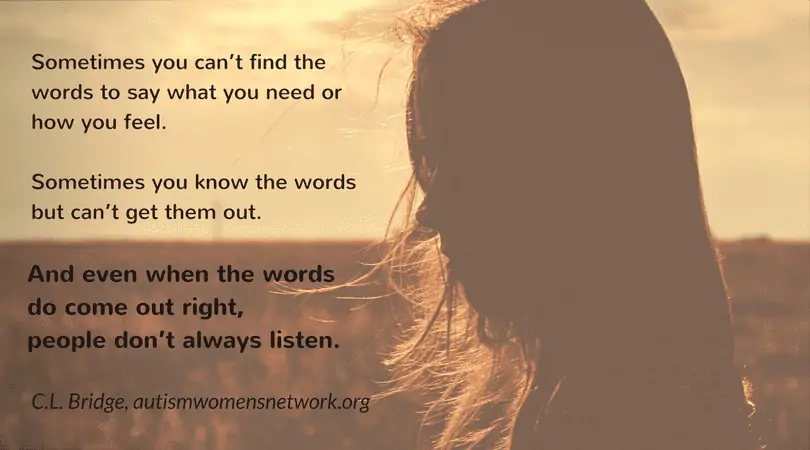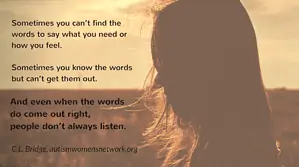
To My Preteen Self
Original post for Autistics Speaking Day
by C.L. Bridge
Dear eleven-year-old me,

Image is a warm toned photo of a young person with long hair, shown in profile against the background setting of a meadow. Text says, “Sometimes you can’t find the words to say what you need or how you feel. Sometimes you know the words but can’t get them out. And even when the words do come out right, people don’t always listen. ~ C.L. Bridge, awnnetwork.org”
Hello from the future! There are so many things I want to tell you. But first, I suppose I should explain what Autistics Speaking Day is, and why I chose to write to you on this day. For you, it’s 2003. Autistics Speaking Day won’t exist until 2010, but it is a day when autistic people share their thoughts and stories, and make their voices heard.
I know it’s hard for you to make your voice heard. Sometimes you can’t find the words to say what you need or how you feel. Sometimes you know the words but can’t get them out. Sometimes you end up saying things you don’t mean. And even when the words do come out right, people don’t always listen.
Sometimes you hide your joy, sadness and fear behind anger, without even realizing that is what you are doing. You’ve been called a crybaby. You’ve been told that your expressions of joy make you look weird. That’s why sometimes, when you want to say something sweet, it comes out as sarcasm. It’s why sometimes, when you want to hug someone, you pull away instead. I wish I could show you the movie Inside Out, because you would enjoy it, and it would help you understand yourself better. But it won’t come out until you’re in college.
Yes, you will go to college. No, college isn’t all about sleepless nights and ten page papers, despite what you may believe now. In community college you won’t fit in with most of your classmates, but you will like most of your professors and most of your classes. When you move on to university, you will finally find your people. You will have fun, learn a lot, create things, overcome many challenges… and you will do it all surrounded by friends who love you.
But let’s get back to feelings and autism. I want you to know that your feelings and preferences are okay, even when others don’t think so. You don’t have to stay at a sleepover party you aren’t enjoying, even if your friend is the birthday girl. Liking Pokémon is not babyish, even though some of your peers will take many years to realize that. And it’s okay that you have feelings and questions about your diagnosis.
“I am not autistic,” I hear you say. “Tony Attwood’s book says autistic people are great at math, but I’m no good at math! It says autistic people prefer nonfiction and are bored by fiction, but I’d much rather read a fairy tale than an encyclopedia. Worst of all, it says autistic people lack empathy. I care about others!”
That book will be outdated when you’re my age, and it isn’t completely accurate. Many autistic people enjoy fiction and struggle with math. We are totally capable of caring for others. Sometimes doctors and psychologists don’t understand us as well as they think they do. You are autistic, and that’s not a bad thing, even if some books and TV commercials make it sound like a bad thing.
Speaking of psychologists, hold on to yours. He’s on your side. I know you don’t think so right now, and it was unwise of your parents to avoid telling you why you were taken to see him. But he knows a thing or two about accepting differences. Your older self has discovered the hard way that many psychologists want to turn autistic people into someone we’re not. The psychologist who diagnosed you with autism will never try to turn you into someone you’re not. I wish you could find the words to ask him some of your autism questions.
I’d also advise you to leave your school before seventh grade. If you stay, you’ll be stuck in a classroom with much older kids who constantly get away with inappropriate behavior. They will not be a good example for you. You won’t learn much English, math, science, or history in that classroom either. You’ll learn more of that by teaching yourself at home.
You’ll learn those subjects in college too—and you’ll also learn how to play chess. The student who teaches you to play chess will become a wonderful friend. You’ll even learn to take care of marine mammals. Yes, marine mammals. I don’t want to spoil too much, but close encounters with large aquatic creatures are in your future.
One day, you will write a letter to an autism specialist because you believe the way this specialist describes girls like you is unfair. This letter, your first advocacy letter, will never be answered. However, you will keep writing letters about autism. Some people won’t answer, but some will. Some won’t understand, but some will. Some of these letters will make real changes, because the people who received them heard your voice and listened.
It’s Autistics Speaking Day. Your voice—our voice—is more powerful than you think.
Wishing you courage and hope,
Your twenty-five-year-old self
About the writer, C.L. Bridge
